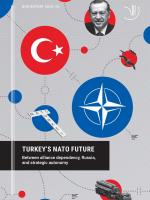The Outlook for Turkey-NATO relations
Turkey-NATO relations are still sufficiently strong to keep the relationship from the brink, a new DIIS-report finds. But more dynamics are also gaining strength to render further troubles increasingly likely.
The future of Turkey’s NATO membership has been the subject of heated debate of late, from both outside and within Turkey. What ramifications will Turkey’s purchase of the Russian S-400 surface-to-air anti-missile system have for Turkey’s NATO future? Has the Syrian conflict exposed deep strategic differences between Turkey and other key NATO members?
In response to such questions, a number of foreign policy practitioners as well as researchers and long-standing Turkey watchers have cautioned that a number of centripetal forces – dynamics that keep member states together - remain sufficiently strong at a structural level to keep Turkey-NATO relations on track.
There seems to be widespread agreement on both sides that the alternative is simply worse. At the same time, the report also argues that these centripetal forces are losing their strength, and that centrifugal forces pulling the alliance apart are gaining strength and salience. Barring wild card developments, the net result is that this will increase the likelihood of further troubles ahead for Turkey-NATO relations
The report is based on an analysis of the published policy commentary, scholarly literature, as well as a series of semi-structured interviews conducted with practitioners and academic experts during the course of 2019.
DIIS Experts



